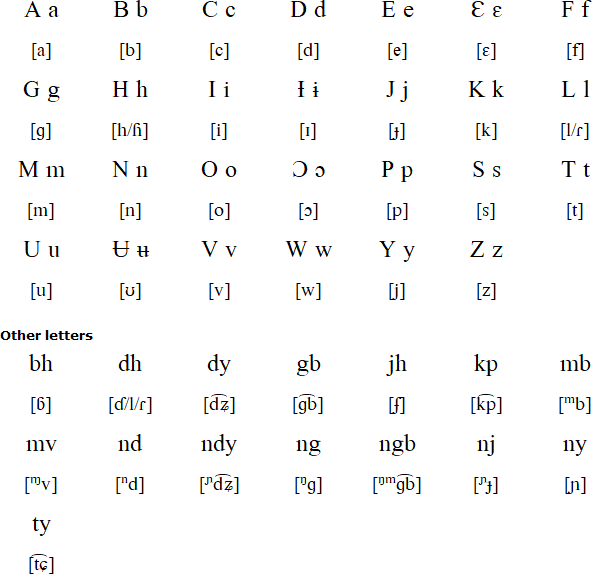Budu is a Bantu language with about 180,000 speakers in the Wamba Territory in the Haut-Uele District in the northeast of the Orientale Province in the northeast of the Democratic Republic of the Congo. In particular, Budu is spoken along the Nepoko River, and the people on each side have their own dialect.
Speakers of Budu call their language Ɨbʉdhʉ and themselves Mabudu. It is also known as Kibudu, Bodo or Ebudu. Dialects include Koya and Nita. A way to write Budu with the Latin alphabet was developed by SIL International in the 1990s, and is used in the Budu translation of the Bible.

Download an alphabet chart for Budu (Excel)
Details of Budu alphabet and pronunciation provided by Wolfram Siegel (PDF)
Yesu a:yaka bɔ : «Ɛmɛ ma itindi-tindi yʉ bʉtɨ; inu na mɨtapɨ. Iyakɛ abio buwei amati asɛmɛ, nɛmɛ buwei amati angɔ, a=mo lipumo lɨja. Jʉ chɔkɔmʉ nɛmɛ na=mbʉkʉkwanana kʉkɨa ɨkyɛɛ.»
Yesu a:sugo bɔ : «Ɨmɨ ma itindindi yɔ bʉtɨ; inu na mɨtapɨ. Ɨyakɛ abio bawele amati asɛmɨ, nɛmɨ bawele amati angɔ, a=mo lipumo lɨja. Dhɔ sɔkɔmʉ nɛmɨ ná=ngɔsisekio akɔkɨa ɨkyɛmʉ.»
Source: Manuel d'Orthographe Budu. M. Bamata-Subama. 1997.
I am the vine, ye are the branches: He that abideth in me, and I in him, the same bringeth forth much fruit: for without me ye can do nothing.
John 15: 5
Source: https://www.bible.com/bible/1/JHN.15.KJV
Information about Budu
https://en.wikipedia.org/wiki/Budu_language
https://fr.wikipedia.org/wiki/Budu_(langue)
https://www.sil.org/resources/search/language/buu
https://glottolog.org/resource/languoid/id/budu1250
http://www.language-archives.org/language/buu
https://www.101lasttribes.com/tribes/budu.html
Aka, Bafaw-Balong, Bangi, Bangubangu, Basaa, Bemba, Bembe, Bena, Benga, Bhaca, Bila, Bube, Budu, Bujeba, Bukusu, Bulu, Bushong, Central Kilimanjaro, Central Teke, Chichewa, Chokwe, Chuwabu, Comorian, Dciriku, Digo, Duala, Eton, Ewondo, Fang, Fuliiru, Ganda/Luganda, Gogo, Gusii, Gwere, Gyele, Haya, Hehe, Herero, Ibinda, Idaxo-Isuxa-Tiriki, Ikizu, Ikoma, Jita, Kabwa, Kako, Kamba, Kanyok, Kiga, Kikuyu, Kimbundu, Kinyarwanda, Kirundi, Kisi, Kobo, Kogo, Komo, Kongo, Konjo, Koti, Kukuya, Kunda, Kuria, Kwambi, Kwasio, Lambya, Lengola, Lingala, Loma, Lozi, Luba-Katanga, Luchazi, Lunda, Luvale, Luyana, Makaa, Makonde, Makhuwa, Mandekan, Maore, Masaaba, Mbama, Mbere, Mbosi, Mbukushu, Mbunda, Mbuun, Mende, Mongo, Mpiemo, Mushungulu, Mwani, Myene, Nambya, Nande, Ngoni, Ngwii, Njebi, Nkore, North Teke, Northern Ndebele (South Africa), Northern Ndebele (Zimbabwe), Northern Sotho, Nyamwezi, Nyakyusa, Nyemba, Nyole, Nyoro, Nyungwe, Nzadi, Oroko, OshiWambo, Pagibete, Punu, Ronga, Safwa, Seki, Sena, Sengele, Shona, Soga, Songe, Southern Ndebele, Southern Sotho, Suba, Sukuma, Swahili, Swati, Taita, Talinga, Tanga, Tembo, Tetela, Tonga, Tooro, Tshiluba, Tsonga, Tswa, Tswana, Tumbuka, Umbundu, Venda, Vili, Vwanji, West Teke, Xhosa, Yakam, Yansi, Yao, Yasa, Yeyi, Zigula, Zinza, Zulu
Languages written with the Latin alphabet
Page created: 28.05.25. Last modified: 28.05.25
[top]
You can support this site by Buying Me A Coffee, and if you like what you see on this page, you can use the buttons below to share it with people you know.

If you like this site and find it useful, you can support it by making a donation via PayPal or Patreon, or by contributing in other ways. Omniglot is how I make my living.
Note: all links on this site to Amazon.com, Amazon.co.uk
and Amazon.fr
are affiliate links. This means I earn a commission if you click on any of them and buy something. So by clicking on these links you can help to support this site.
[top]